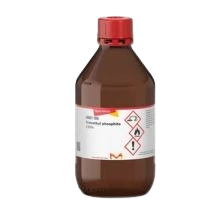Get A Quote
BIS Certification for Trimethyl Phosphite IS 17412: 2020

The Bureau of Indian Standards (BIS) has mandated the registration of Trimethyl Phosphite under the Compulsory Registration Scheme (CRS) as per the Trimethyl Phosphite (Quality Control) Order, 2022. This order, issued by the Ministry of Chemicals and Fertilizers, was published in the official gazette on 5th April 2022 and came into effect 181 days after its publication.
Under this regulation, manufacturers must obtain BIS CRS certification for Trimethyl Phosphite and ensure compliance with Indian Standard IS 17412:2020. This standard specifies the requirements, sampling methods, and tests necessary for certifying Trimethyl Phosphite.
Introduction
BIS CRS
(Compulsory Registration Scheme) certification for Trimethyl phosphite is
mandatory in India to ensure compliance with safety and performance standards
established by the Bureau of Indian Standards (BIS). This certification plays a
crucial role in promoting safety and confidence in chemical products. The
certification process involves a thorough evaluation of technical specifications,
safety protocols, and quality assurance measures. By securing CRS
certification, manufacturers affirm their dedication to producing high-quality,
reliable chemicals that comply with national regulations, enhancing product
credibility and facilitating market access.
Why is BIS CRS Certification for Trimethyl Phosphite Necessary?
CRS certification is vital for Trimethyl phosphite for several reasons. Firstly, it
ensures safety by protecting users from potential hazards associated with
chemical handling. Secondly, the certification confirms that the product meets
necessary technical specifications and performance benchmarks, ensuring
effective application. This builds consumer trust, instilling confidence that
the products are safe and compliant with regulatory requirements. Additionally,
CRS certification simplifies entry into the Indian market for manufacturers,
boosting their competitiveness. Overall, obtaining this certification helps
manufacturers align with national regulations, promoting safety and reliability
for end-users.
Overview of Indian Standard IS17412:2020
Indian Standard
IS 17412:2020 specifies the technical requirements, test methods, and sampling
criteria for Trimethyl Phosphite. It covers various parameters, including:
- Chemical Composition Analysis: Ensuring the product meets purity and composition standards.
- Safety Testing: Assessing handling and storage safety to prevent hazards.
- Performance Testing: Evaluating effectiveness in its intended applications.
- Stability Testing: Testing chemical stability under various environmental conditions.
- Toxicity Testing: Determining potential health hazards for safe handling.
Process of CRS Certification for Trimethyl Phosphite
The BIS registration process differs slightly for domestic and foreign manufacturers but broadly follows these steps:
For Foreign Manufacturers:
- Nominate an Indian Representative: To get FMCS Certification, a foreign manufacturer must appoint an Indian Representative with a valid business presence in India to handle the registration process.
- Online Application Submission: The representative submits an application via the BIS portal, ensuring all details are accurate.
- Sample Testing: Trimethyl Phosphite samples are tested in a BIS-approved laboratory for compliance with IS 17412:2020.
- Submit Complete Application: The application, along with test reports and required documents, is submitted online or in hard copy.
- BIS Verification: The BIS reviews documents and may conduct factory inspections.
- Grant of License: Upon successful verification, the BIS grants a license, allowing the use of the CRS mark.
For Domestic Manufacturers:
- Submit Online Application: Domestic manufacturers directly apply on the BIS portal to begin the registration process.
- Sample Testing: Like foreign manufacturers, samples are tested at a BIS-recognized lab.
- Submit Application: A complete application, including test reports, is submitted to the BIS.
- Verification: The BIS reviews documents and may inspect the manufacturing facility.
- License Grant: After successful verification, the BIS issues a license for using the CRS mark.
Documents Required for BIS Certification
Below is a comprehensive checklist of documents needed for BIS registration:
General Documents:
● Filled CDF/CCL forms.
● BIS application form.
● Business License (original + English translation).
● Scope of Business License (original + English translation).
● ISO Certification of the manufacturing unit.
● Product marking label details.
Additional Documents for Foreign Manufacturers:
● Authorization letter (if the signatory isn’t the manufacturing head).
● Trademark certificate.
● Indian Representative's registration proof.
● Photo ID of the authorized representative.
Technical Documents:
● User manual or technical specification sheet.
● Test reports from BIS-approved laboratories.
Conclusion
Obtaining BIS
CRS certification for Trimethyl Phosphite is essential for market compliance
and product credibility. By adhering to IS 17412:2020, manufacturers can ensure
their products meet the highest safety and quality standards. With EVTL India’s
professional consultancy services, manufacturers can streamline the
certification process, ensuring hassle-free compliance with BIS regulations.
Contact us today to secure your BIS CRS certification for Trimethyl Phosphite
and enhance your market reach with confidence!
Free Call Back
Latest News & Update
🚀 Breaking News: New software update available for all users!
💡 Latest Feature: Introducing AI-powered automation tools.
📅 Upcoming Event: Join us for the webinar on September 30th.
🕒 Support Hours: Expanded customer support hours next week.
⚙️ Tech Tip: Learn how to maximize productivity with our latest tools.
Why Choose EVTL INDIA
Expertise in Indian Regulatory Standards
End-to-End Support
Trusted by Top Indian & Global Brands
Fast Processing & Transparent Pricing
Strong Liaison with Indian Authorities
Company Profile














